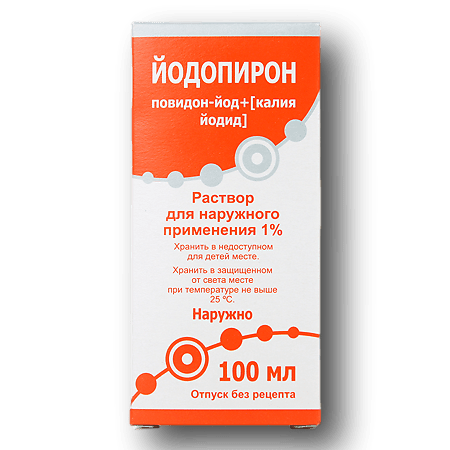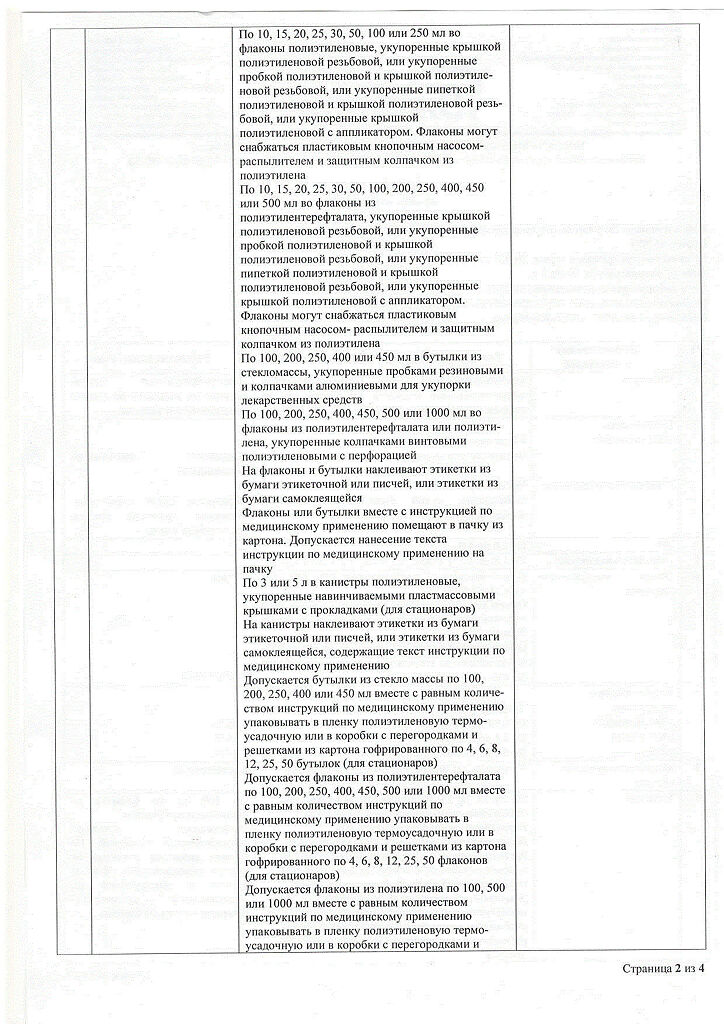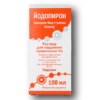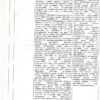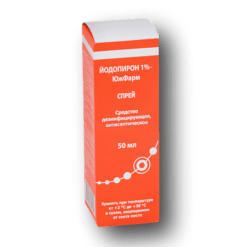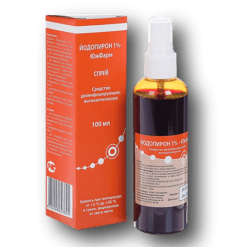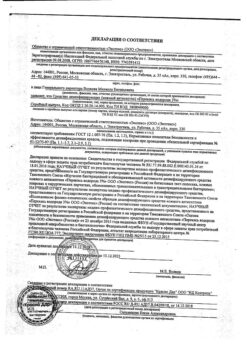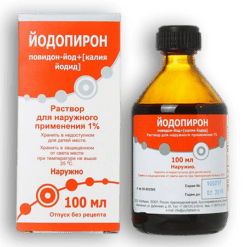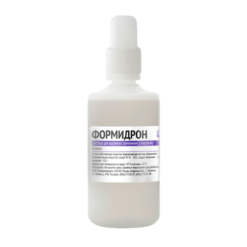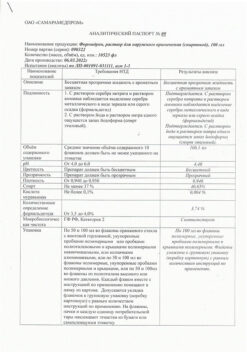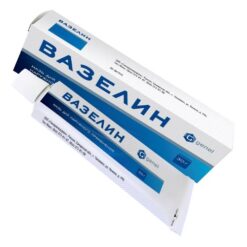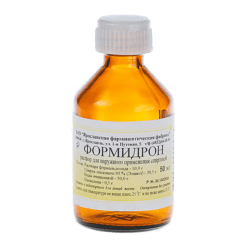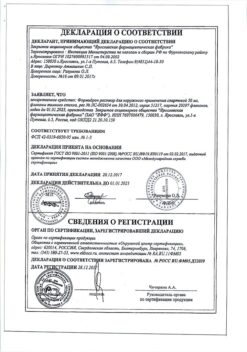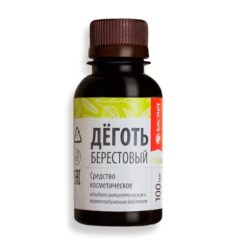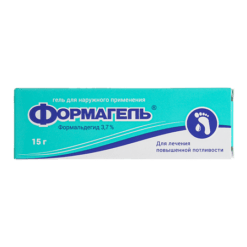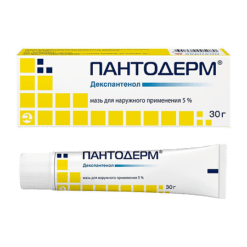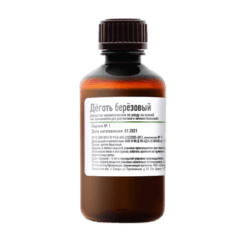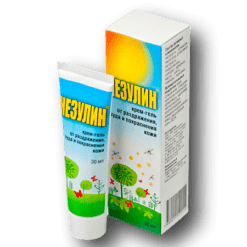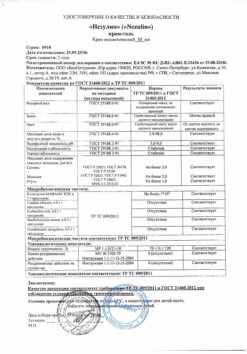No products in the cart.
Iodopyron, 1% 100 ml
€11.35 €9.93
Description
Iodopyron is an antiseptic, when used topically it has bactericidal (against a wide range of Gram-positive and Gram-negative microorganisms, including antibiotic-resistant strains of E. coli, Staphylococcus aureus and Proteus), fungicidal and anti-inflammatory effects.
Elemental iodine has pronounced antimicrobial properties. Elemental iodine preparations are characterized by a pronounced local irritating effect on tissues, and in high concentrations – a cauterizing effect. Local action is due to the ability of elemental iodine to precipitate tissue proteins. Preparations that detach elemental iodine have much less pronounced irritating effect, and iodides have local irritating properties only in very high concentrations.
The nature of the resorptive action of preparations of elemental iodine and iodides is the same. Iodine preparations have the most pronounced resorptive effect on thyroid function. In case of iodine deficiency, iodides help to restore the disturbed synthesis of thyroid hormones. With normal levels of iodine in the environment, iodides inhibit the synthesis of thyroid hormones, reducing the sensitivity of the thyroid gland to pituitary TTH and blocking its secretion by the pituitary gland.
The effect of iodine preparations on metabolism is manifested by increased dissimilation. In atherosclerosis they cause a slight decrease in the concentration of cholesterol and beta-lipoproteins in the blood; in addition, they increase fibrinolytic and lipoproteinase activity of blood serum and slow down the rate of blood clotting.
The accumulation of iodine in syphilitic gummas promotes their softening and resorption. However, iodine accumulation in tubercular foci leads to an intensification of the inflammatory process in them. Iodine release by excretory glands is accompanied by irritation of glandular tissue and increased secretion. This causes expectorant action and stimulation of lactation (in small doses). However, in high doses iodine preparations may cause suppression of lactation.
Pharmacokinetics
On contact with skin or mucous membranes, 30% is converted to iodides and the rest to active iodine. It is partially absorbed. The absorbed part penetrates into tissues and organs, is selectively absorbed by the thyroid gland. It is excreted mainly by the kidneys, intestines, sweat and mammary glands.
Indications
Indications
For external use: infectious and inflammatory skin lesions, injuries, wounds, myalgia.
For local use: chronic tonsillitis, atrophic rhinitis, purulent otitis media, trophic and varicose ulcers, wounds, infected burns, fresh thermal and chemical burns of I-II degree.
For oral administration: prevention and treatment of atherosclerosis, tertiary syphilis.
Pharmacological effect
Pharmacological effect
Iodopirone is an antiseptic; when applied externally, it has a bactericidal (against a wide range of gram-positive and gram-negative microorganisms, including antibiotic-resistant strains of Escherichia coli, Staphylococcus aureus and Proteus), fungicidal and anti-inflammatory effects.
Elemental iodine has pronounced antimicrobial properties. Elemental iodine preparations are characterized by a pronounced local irritating effect on tissue, and in high concentrations – a cauterizing effect. The local effect is due to the ability of elemental iodine to precipitate tissue proteins. Preparations that remove elemental iodine have a much less pronounced irritating effect, and iodides have local irritating properties only in very high concentrations.
The nature of the resorptive effect of elemental iodine and iodides preparations is the same. During the resorptive effect, iodine preparations have the most pronounced effect on the functions of the thyroid gland. In case of iodine deficiency, iodides help restore impaired synthesis of thyroid hormones. With normal iodine content in the environment, iodides inhibit the synthesis of thyroid hormones, the sensitivity of the thyroid gland to pituitary TSH decreases and its secretion by the pituitary gland is blocked.
The effect of iodine preparations on metabolism is manifested by increased dissimilation processes. In atherosclerosis, they cause a slight decrease in the concentration of cholesterol and beta-lipoproteins in the blood; in addition, they increase the fibrinolytic and lipoproteinase activity of blood serum and slow down the rate of blood clotting.
Accumulating in syphilitic gums, iodine promotes their softening and resorption. However, the accumulation of iodine in tuberculosis lesions leads to an increase in the inflammatory process in them. The release of iodine by the excretory glands is accompanied by irritation of the glandular tissue and increased secretion. This is due to the expectorant effect and stimulation of lactation (in small doses). However, in large doses, iodine preparations can cause suppression of lactation.
Pharmacokinetics
Upon contact with skin or mucous membranes, 30% is converted into iodides, and the rest into active iodine. Partially absorbed. The absorbed part penetrates tissues and organs and is selectively absorbed by the thyroid gland. It is secreted mainly by the kidneys, intestines, sweat and mammary glands.
Special instructions
Special instructions
With prolonged use, phenomena of iodism are possible.
For nephritis and nephrosis, it is contraindicated for oral administration.
Active ingredient
Active ingredient
Povidone-Iodine, [Potassium iodide]
Composition
Composition
Active ingredients:
iodine 14.1 g;
Excipients:
potassium iodide 13.8 g,
low molecular weight povidone 122.1 g,
purified water up to 1000 ml
Contraindications
Contraindications
Individual iodine intolerance.
For oral administration – pulmonary tuberculosis, nephritis, nephrosis, adenomas (including the thyroid gland), furunculosis, acne, chronic pyoderma, hemorrhagic diathesis, urticaria, pregnancy, children under 5 years of age.
Side Effects
Side Effects
For external use: rarely – skin irritation; with prolonged use on large wound surfaces – iodism (rhinitis, urticaria, Quincke’s edema, salivation, lacrimation, acne).
When taken orally: allergic skin reactions, tachycardia, nervousness, sleep disturbances, increased sweating, diarrhea (in patients over 40 years of age).
Interaction
Interaction
Pharmaceutically incompatible with essential oils, ammonia solutions, white sedimentary mercury (an explosive mixture is formed). An alkaline or acidic environment, the presence of fat, pus, and blood weaken the antiseptic activity.
Weakens the hypothyroid and goitrogenic effects of lithium preparations.
Storage conditions
Storage conditions
In a dry place, protected from light, out of reach of children.
Shelf life
Shelf life
See packaging.
Manufacturer
Manufacturer
YuzhPharm LLC, Russia
Additional information
| Shelf life | See on the package. |
|---|---|
| Conditions of storage | In a dry place, protected from light, out of the reach of children. |
| Manufacturer | YuzhPharm, Russia |
| Medication form | solution for external use |
| Brand | YuzhPharm |
Other forms…
Related products
Buy Iodopyron, 1% 100 ml with delivery to USA, UK, Europe and over 120 other countries.

